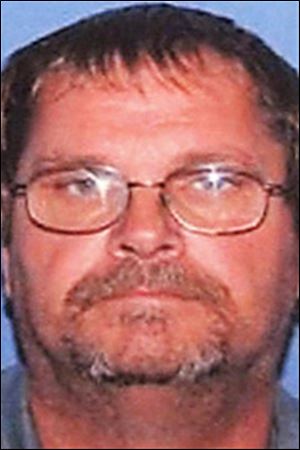
Video evidence in chop-shop case challenged
8/12/2014
Wymer
Around the clock for more than four months, federal investigators watched the goings-on at a purported chop shop in central Toledo with a high-tech video camera that was mounted atop a telephone pole.
Attorneys for Michael G. Wymer, the alleged leader of the operation, have asked U.S. District Judge James Carr to suppress the evidence collected by the pole camera, contending the birds-eye view it provided amounted to a warrantless search that violated Wymer’s expectation of privacy.
Wymer, 55, is charged with conspiracy and multiple counts of transportation of stolen vehicles, transportation of stolen goods, and theft of interstate shipments by carrier.
The U.S. Attorney’s Office alleges he led a group that transported stolen tractor-trailer rigs and cargo from Michigan and Indiana to “chop shops” at 642 Sterling St. and 2322 Consaul St. in Toledo. Federal prosecutors allege the stolen trucks and goods were then either sold, cut up into scrap metal, or broken up for parts.
Defense attorneys John McMahon and Merle Dech said that in September, 2012, law enforcement officers installed a camera that could pan left and right, tilt up and down, and zoom in and out on a utility pole on the west side of Wymer’s Sterling Street shop and garage. The camera, they allege, had “super-human abilities” that allowed investigators to see what could not be viewed from the ground.
“The secret constant video recording of an individual in their place of business and where they reside is an invasive form of electronic surveillance,” a memo filed in federal court Monday states. “Video surveillance allows law enforcement to capture the details of a person’s life. It allows law enforcement to ‘zoom in’ on what law enforcement feels is important, rewind these events, and watch them over and over. This is of great concern when the camera in question can easily film 180 to 200 feet, undetected, at all hours of the day and night.”
Federal prosecutors did not seek or obtain a search warrant before installing the camera, they contend.
“Although the officers did not physically enter the property leased by Wymer, the video camera effectively allowed the officers to do so, meaning the officers conducted ‘a search’ under the Fourth Amendment,” the memo states.
In their response to the motion to suppress, U.S. attorneys countered that the camera “could not and did not view anything that was not visible from the public streets adjacent to the [property], and the location was always maintained as a commercial site open to the public.”
Wymer did not install screening or privacy enhancing measures, they wrote. “Because there is no expectation of privacy in such a location, and certainly not a reasonable expectation of privacy protected by the Fourth Amendment, there was no search.”
Federal prosecutors have until Aug. 18 to file a final reply in the matter. The case is set for trial Sept. 22.
Contact Jennifer Feehan at: jfeehan@theblade.com or 419-213-2134.